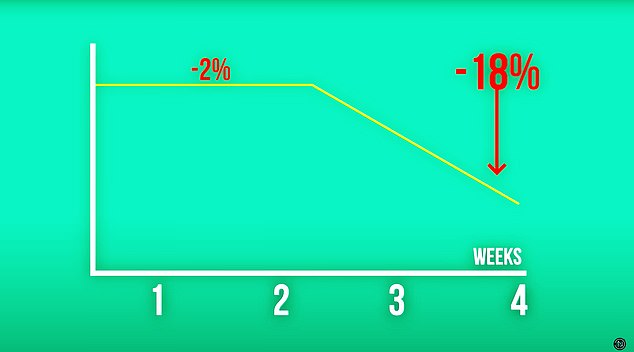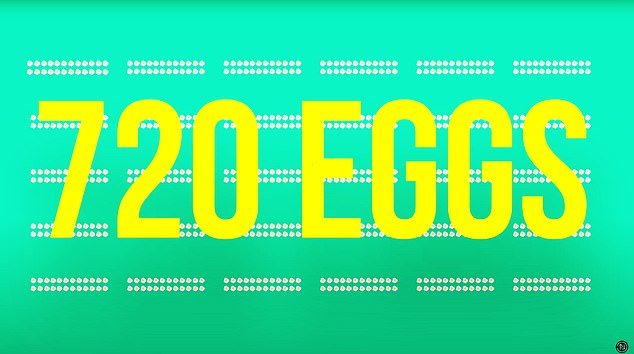I ate 700 eggs a month as an experiment – what happened to my health went against everything I was told
Ask any doctor about eggs and he or she will probably tell you that they raise your cholesterol levels and can cause you to die prematurely.
Yet they are seen as a superfood in gyms.
To find out whether eggs are bad or not, a man ate 720 eggs in one month to see what really happens when you eat eggs.
Dr. Nick Norwitz, a doctoral student at Harvard University, found that his cholesterol levels actually dropped, contrary to what many doctors think.
Dr. Nick Norwitz ate 720 eggs in a month and saw his cholesterol levels drop. He is pictured above with over 40 cardboard egg cartons from the ‘eggs-periment’
After the month-long experiment, in which he ate the equivalent of 24 eggs a day, providing 1,800 calories, his LDL (low-density lipoprotein), or “bad,” cholesterol levels dropped by 18 percent.
LDL is considered “bad cholesterol” because it can build up as plaque in the arteries, increasing the risk of heart disease and stroke.
The other type of cholesterol, high-density lipoprotein (HDL) or “good” cholesterol, has the opposite effect. It helps remove excess cholesterol from the bloodstream and transport it to the liver.
Experts have been criticizing the cholesterol in eggs for decades, warning that eating them can raise LDL levels and increase the risk of complications.
Dr. Norwitz received his PhD in human brain metabolism from the University of Oxford and is currently completing his PhD in medicine at Harvard University.
He first became interested in nutritional science after battling ulcerative colitis, an inflammatory bowel disease that causes ulcers, which left him hospitalized and sometimes bedridden.
Ultimately, he decided to try the ketogenic diet, which provides 70 percent of calories from fats, despite warnings from doctors not to use the diet to treat his condition.
In 2021, he announced his decision to STAT: “After a week on a ketogenic diet, my colitis symptoms started to disappear.
‘In the months that followed, I stopped taking my colitis medications. Two years later, I’m still on a ketogenic diet and my colitis is still in remission.’
In the video, which has been viewed more than 160,000 times on YouTube, he said he wanted to show that eating eggs does not lead to increased cholesterol levels.

This graph shows how his cholesterol levels dropped during the four-week experiment. They were revealed using blood tests
Dr. Norwitz said, “I hypothesized that eating 720 eggs in one month, which alone amounts to 133,200 mg of cholesterol, would not raise my cholesterol. More specifically, it would not raise my LDL cholesterol.
‘And that indeed did not happen, not one bit.’
He added: ‘Even though my dietary cholesterol intake increased more than fivefold, my LDL cholesterol dropped.’
During the experiment, he tested the cholesterol levels in his body through blood tests.
Eggs contain about 186 milligrams (mg) of cholesterol each. Other foods high in cholesterol include red meat, shellfish, and tropical oils.
Some scientists wonder why eggs don’t raise cholesterol levels: In the intestines, cholesterol binds to receptors on intestinal cells, triggering the release of a hormone called cholesin.
This travels through the blood to the liver, where it binds to a receptor called GPR146. This receptor signals the liver to produce less LDL, so that LDL levels in the body remain at normal levels.
After the first two weeks of his experiment, Dr. Norwitz also decided to start eating 60 grams of carbohydrates per day in the form of fruits such as bananas and blueberries.

Dr. Norwitz explained the mechanism why his cholesterol levels dropped despite eating so many eggs

He said a lot of it was because he had also been eating carbohydrates, which his body used for energy.
He explained how eating more carbohydrates can help further lower cholesterol levels in the body.
In people who follow a low-carb diet, LDL levels in their bodies often rise because their bodies start burning fat for energy instead of carbohydrates.
But when a person eats more carbohydrates, the opposite happens: the LDL levels in the body decrease because the person gets more energy from carbohydrates.
In the experiment, he ate 60 grams of carbohydrates per day in the form of bananas, blueberries, strawberries and frozen cherries.
That is equivalent to two bananas a day, or 600 grams of blueberries.
One viewer commented on the video, “I clicked on it because I knew my LDL levels wouldn’t go up and I want to share this video with some family members who are concerned about me eating all those eggs and meat!”
A second added: ‘I have eaten eggs almost every day of my 67 years, through all the good/bad times, and have never given them up. And I am in very good health, no doctors, no drugs.’
